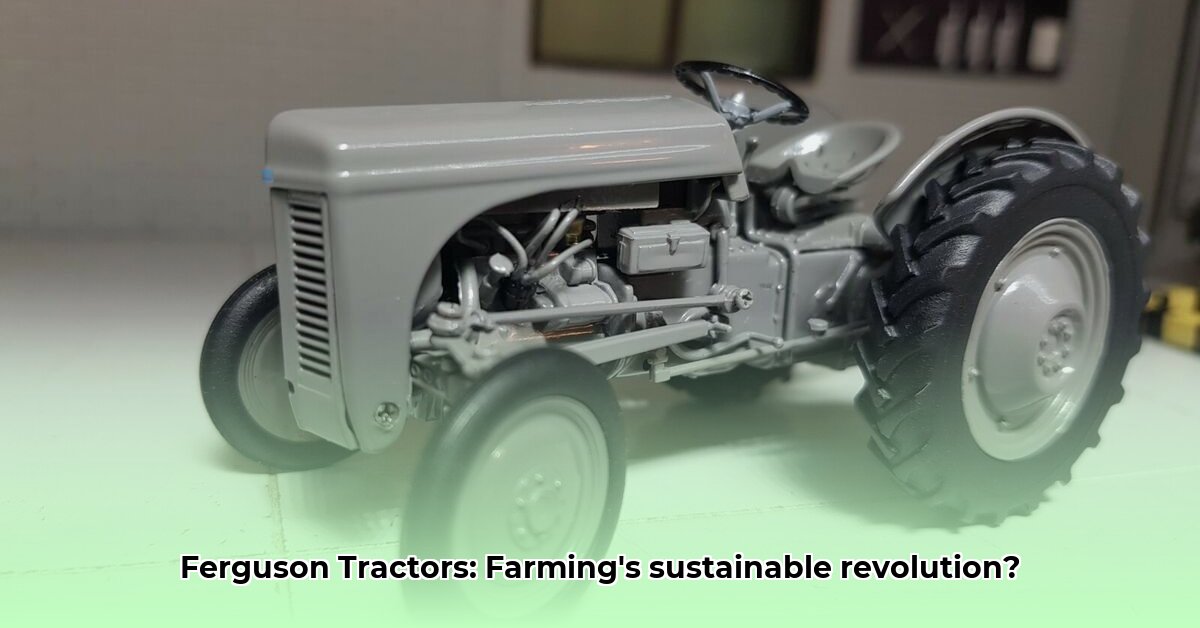
A Legacy of Innovation: Massey Ferguson and Sustainable Agriculture
Massey Ferguson tractors have a long and storied history, inextricably linked to the evolution of farming practices. From the revolutionary three-point hitch to today's technologically advanced models, Massey Ferguson has consistently pushed the boundaries of agricultural efficiency. This article explores how Massey Ferguson tractors are not only contributing to increased productivity but also playing a vital role in the transition towards more sustainable farming methods. We'll examine specific models, key features promoting sustainability, and the company's commitment to a greener future. For those considering purchasing, check out tractor costs.
A Historical Perspective: Shaping the Landscape of Farming
The invention of the three-point hitch—a hallmark of early Ferguson tractors—marked a pivotal moment in agricultural history. This simple yet ingenious design dramatically increased the efficiency of farming operations, allowing for quicker attachment and detachment of various implements. This innovation laid the groundwork for the sophisticated machinery we see today. Early Ferguson models, while focused primarily on power and productivity, inadvertently set the stage for the present-day emphasis on sustainable practices. The increased efficiency afforded by these early designs paved the way for technologies that minimize resource consumption and reduce environmental impact.
Modern Massey Ferguson Models: Sustainability in Action
Modern Massey Ferguson tractors are engineered with sustainability at their core. Several key features contribute to a reduced environmental footprint and improved resource management. These advancements represent a conscious effort to balance agricultural productivity with environmental responsibility.
Fuel Efficiency: Optimizing Performance, Minimizing Waste
Many current models boast highly efficient engines, designed to maximize fuel economy and minimize emissions. Advanced engine management systems precisely control fuel delivery, ensuring optimal combustion and reducing fuel waste. Further contributing to fuel efficiency are optimized transmissions and hydraulic systems, which enhance power transmission and reduce energy loss. Proper tire inflation is also crucial; under-inflation significantly impacts fuel consumption.
Precision Farming: Targeted Application, Reduced Waste
Precision farming technologies, integrated into many Massey Ferguson tractors, are revolutionizing sustainable agriculture. GPS-guided implements allow for targeted application of fertilizers, pesticides, and other inputs. This minimizes waste, reduces environmental runoff, and optimizes resource use. Variable rate technology further enhances efficiency by adjusting input levels based on real-time soil conditions.
Reduced Emissions Technologies: Minimizing Environmental Impact
Massey Ferguson is committed to reducing the environmental impact of its tractors. Advanced emission control systems significantly lower greenhouse gas emissions, contributing to cleaner air and a reduced carbon footprint. These technologies are vital in mitigating the contribution of agriculture to climate change. Moreover, improved tractor design, including reduced weight and optimized tire pressure, minimizes soil compaction, promoting healthier soil ecosystems.
Massey Ferguson's Commitment to Sustainable Practices
Massey Ferguson's dedication to sustainability extends beyond individual tractor features. The company actively invests in research and development, exploring alternative fuels like biofuels and developing more environmentally friendly manufacturing processes. These efforts reflect a broader corporate commitment to responsible environmental stewardship. While challenges remain in achieving completely sustainable practices, Massey Ferguson's commitment signals a significant step towards a greener agricultural future. However, challenges remain, such as the accessibility of new technologies for smaller farms.
The Future of Sustainable Agriculture: A Collaborative Effort
The future of sustainable agriculture hinges on continued innovation and collaboration. We can anticipate further advancements, including autonomous tractors and alternative fuel sources. These advancements promise even greater efficiency and reduced environmental impact. However, the successful adoption of these new technologies will require a collective effort from farmers, manufacturers, researchers, and policymakers. Addressing the financial barriers to entry for smaller farmers will be crucial to achieving widespread adoption of sustainable practices.
Conclusion: Embracing a Sustainable Future
Massey Ferguson tractors exemplify the ongoing evolution of agricultural technology, demonstrating a strong commitment to sustainability. Through advanced features promoting fuel efficiency, precision farming, and reduced emissions, these tractors are directly contributing to a more environmentally responsible approach to agriculture. The future lies in the ongoing development and adoption of sustainable practices, effectively balancing the need for food production with the imperative of environmental protection. This journey requires continuous innovation and a collaborative spirit across the entire agricultural ecosystem.